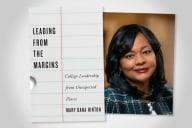You have /5 articles left.
Sign up for a free account or log in.
We tend to think of "fairness" as an ideal; as something to strive for. A "fair" outcome, according to Stephen T. Asma, is typically defined in one of two ways: either everyone gets an equal share of the good, or those who prove greater merit (in terms of skill, intelligence, hard work, etc.) get greater rewards.
In his new book -- aptly titled Against Fairness (University of Chicago Press) -- Asma makes the case that personal favoritism, which we often view as immoral or even corrupt, is in fact "a source of virtue and value." In situations ranging from nepotistic hiring to affirmative action to raising children, Asma contends that personal favoritism is not only natural but also ethically defensible, even preferable.
Inside Higher Ed interviewed Asma -- who is Distinguished Scholar and professor of philosophy, as well as Fellow of the Research Group in Mind, Science, and Culture, at Columbia College Chicago -- via e-mail to learn more about his book and his arguments.
Q: You argue for the superiority of personal favoritism over "fairness" as defined by either merit or equal-share distribution. What are some of the virtues of favoritism?
A: Contemporary Americans tend to think of morality as a set of rules rather than as virtues or modes of character. American values assert freedom from harassment and freedom to fulfill basic human capabilities, but positive and substantial notions of good are noticeably absent beyond this rudimentary ethical conversation. In my book, I try to show that certain virtues thrive in non-egalitarian contexts. Loyalty, for example, comes to the foreground in the context of our tribal devotions – using “tribal” generally. We have circles of favorites (i.e., family, friends, allies) and we mutually protect each other, even when such devotion disadvantages us personally. But the interesting thing about loyalty is that it ignores both merit and fairness. It’s not premised on optimal conditions. You need to have my back, for example, even when I’m sometimes wrong. You need to have my back, even when I sometimes screw up the job. And I have to extend to you the same loyalty.
I also think generosity can flourish under the umbrella of favoritism. Generosity is a virtue that characterizes the kind of affection-based giving that we see in nepotism. So often, nepotism is confused with corruption, when it really just means family preference. And favoritists (if I can invent a word here) are very good at selflessly giving to members of their inner circle.
Along with generosity, I think gratitude is a virtue that thrives more in a favoritism context. In a fair system, people are supposed to get what they deserve or they get equal shares (I actually think these outcomes are rare, but at least they’re the ideal), but in favoritism (like a love relation) people can get way more than they deserve. In a real circle of favorites, one needs to accept help gracefully. We must accept, without cynicism, the fact that some of our family and friends give to us for our own sake (our own flourishing) and not for their eventual selfish gain. However animalistic were the evolutionary origins of giving (and however vigorous the furtive selfish genes), the human heart, neocortex, and culture have all united to eventually create true altruism. Gratitude is a necessary response in a sincere circle of favorites.
Q: "[A]s an American college professor," you write, "I am not allowed to reveal a student's grade to anyone but the student, as it is considered a violation of the student's privacy. If I publicly posted the merit-earned grades of my students, I could lose my job." Would you argue, then, for a system in which students' grades were publicly posted? Why or why not?
A: Yes, I think students’ grades should be posted. By thinking of our students as teacup-fragile, we have probably made them teacup-fragile. I don’t see how this is a service to them. I’ve taught kids in Cambodia and China, and my own son is half-Chinese and started school in Shanghai. Kids are definitely tougher in Asia – they have to face their failures regularly, but their self-esteem is not crushed by it and they tend to excel at whatever they put their minds to. Resilience and the ability to accept occasional defeat, or humbly enjoy the accolades of success, are good for character.
I don’t give all my students the same grade out of some duty to egalitarianism. So why should I hide the true hierarchy from the students?
In the West, we stress the idea that our worth and value is a private inner condition of the individual, but in face-cultures like China one’s value is also public. So, public shame and success are considered great motivators. Are there abuses of this? Yes, of course, but most students thrive and excel in this non-egalitarian context too.
Q: Why do you write that affirmative action is an "unnatural fit with egalitarian philosophy"? What other arguments (if any) can be made for it?
A: Contrary to the usual rhetoric, I don’t think “fairness” helps us navigate the affirmative action issue. Is it more “fair” to privilege people of color in affirmative action scenarios, or is it more fair to treat everyone in a color-blind unbiased fashion? The concept of fairness won’t help resolve this, but we might make real progress if we jettisoned the fairness lingo and replaced it with the pursuit of social health.
Politics is more like medicine, not like math or physics. Justice, like health, is advanced through practical reason, not theoretical reason. And our body politic needs some medical attention.
It is possible to reasonably treat people preferentially, if the larger social organism is benefited. This is not the same as simply enacting policies for the majority. A doctor’s goal is whole-body health, but he doesn’t treat the whole body equally – he ministers to medical problems individually – doing immunotherapy here, radiation therapy there, hormonal adjustments, setting broken bones, dialysis, transfusions, and so on. It is essential to treat different organs with uneven and unfair attention and care. That careful discrimination is what brings health to the overall organism and, by analogy, the nation.
University admissions can be understood in this context of overall social health. The original demographic targeted by Johnson-era affirmative action (impoverished descendants of African slaves) is not reaping the benefits of contemporary affirmative action (a fact agreed upon by both the Left and Right), but there is still good reason for preferential treatment of select groups in university admissions. To wit, we need diversity on campuses because it introduces fresh perspectives into the transmission of our cultural knowledge, and the creation and discovery of that knowledge. Moreover, it tends to increase tolerance, empathy, and understanding across groups inside and eventually outside the academy. But if, as is often pointed out, current affirmative action is privileging the more well-off students of color (from around the globe), then the program needs modification to target economic diversity more than ethnic diversity.
I think such preferential programs are defensible from the perspective of the individuals involved and the holistic perspective of the larger social fabric. "Fairness" is not the helpful criterion of analysis or policy.
Q: "We should not use the abuses of nepotism to damn nepotism per se," you write. How can we distinguish between the two?
A: Not to be too glib here, but I think you can be pro-chocolate but anti-obesity. And in the same way, I’m pro-nepotism, but I recognize the problems of overindulgence. When is family preference too much? Well, I doubt that there’s a universal rule for all cases. I think, rather, that you’ll know it when you see it.
Consider our intuitions about these two cases:
Let’s say I own a tavern, and I regularly book musical groups to entertain the patrons. Many good music combos want to play my tavern, because the crowd is big and appreciative and the pay is decent. My brother has a half-baked uninspired quartet that can muddle through some tunes adequately. I hire his band regularly to perform at the tavern (excessively even), not because he’s good or he’s the most deserving, but because he’s my brother. I even pay him an extra $50. Have I sinned according to the grid of egalitarian impartiality? Probably. Looking at the scenario as a disinterested spectator would probably lead me to disfavor my brother. But my favoritism here seems like small potatoes. Philosophers like Kant would probably chastise me, for letting sentiments infect my decision, but most of us would do the same without much hand-wringing.
Now here’s a more troubling case. In the spring of 2011, the owner of a media company mobilized his organization to buy a smaller television production company. He was accused of overpaying for the acquisition because his daughter was the owner of the purchased company. Is this a reasonable form of nepotism? Is it different than the tavern case? It probably doesn’t raise your dander much, until I add the following details. The father was billionaire Rupert Murdoch and he was trying to buy his daughter’s company, Shine Group, for $675 million dollars -- $320 million of which would go to his daughter Elisabeth.
Adding more contextual details to this case puts it in a different ethical light than our earlier case. The staggering excesses of the wealth involved here really do change the ethical flavor of the nepotism. What’s the difference between the two cases? It’s not just the difference in monetary amounts, but the meaning of those amounts. There are different stakes in these cases, because the extra $50 actually improves the life (albeit modestly) of my brother the musician and has negligible negative impact on the other parties involved. Whereas, $320 million is absurdly over the threshold of an improved life, and the concentration of that much surplus has a substantial negative impact on the other parties involved. Not to mention the fact that Rupert has no need to inflate the bid for his daughter’s company, if the accurate bid is more than she can ever spend in a lifetime of Roman-style debauchery. The modest nepotism of the brothers seems reasonable, touching, and even a little sad. The nepotism of the Murdochs seems troubling by comparison. But, your "principled" readers will no doubt protest and accuse me of being inconsistent in my judgment. To which I respond, yes… I’m fine with inconsistency here. The two cases of nepotism are not ethically commutable or interchangeable.
Q: You note that your son is of mixed race -- white and Chinese -- and that "If I can give him some advantage by marking him as 'Chinese' on some application, I do it. If there seems an advantage to being marked white, I do it." This is an issue that has come up increasingly in college admissions. Is there any reason why all students (or at least those who plausibly can) should not attempt to advantage themselves this way? Is it fair to colleges (and does that even matter)?
A: The university is a way in which students gain knowledge of course, but we’d be naïve if we didn’t recognize that it’s also a way of positioning one’s children for future success. As such, it’s a competitive crucible. Families must negotiate the institution as an end in itself but also a means to further ends.
Yeah, I guess I stand by what I said. I don’t think it’s simply mercenary selfishness on parents’ parts to try to advantage their children. I’m suggesting that I have ethical duties to my own children that may come into conflict with those same duties in strangers’ families. That’s the cold truth, I’m afraid, and we should work on a developing a more mature ethics that acknowledges some of these intrinsic tensions of competing goods. I’m sure it will be unsettling for some readers, but I think what Evelyn Waugh said about nation states might be true for families too. “I do not think,” Waugh stated, “that British prosperity is inimical to anyone else, but if, on occasion, it is, I want Britain to prosper and not her rival.”
Q: Grading, you write, is one area in which "tough contextual decisions" have to be made -- for example, in the case of a student whose parent dies mid-semester, or who writes well but "is a homophobic jerk," or a student who is struggling in class but you've heard "playing the most transcendent Bach piano concerto in the student center." If fairness isn't the primary aim of your grading, what is? Can you explain your philosophy?
A: Let’s be clear, I won’t give an F student an A in philosophy because they can play Bach. I was trying to isolate an important point about practical judgment versus theoretical judgment. We make all kinds of nuanced judgments about ethics that are not and should not be simple algorithmic applications of universal rules to particulars. In giant lecture halls, where you can’t know students, you are reduced to algorithmic grading. But in smaller classrooms, where you get to know your students, you make all kinds of value judgments that are more contextual and less robotic. Are there abuses of such judgments? Yes, of course. But most seasoned professors become fairly wise, with experience and practice, at making appropriate practical judgment evaluations of students.
The aims of grading are not “fairness” – that would be an exercise for machines. Grading does many things. It recognizes a quality of information-processing in the student, but more importantly, it recognizes passion for learning, humility, ambition, courage of thought, depth of insight, temperance of speculation, discipline of work ethic, but also conceptual discipline, open-mindedness, willingness to listen, to follow up research leads, and many more achievements of academic life. Moreover, a grade is also a normative message to a student. Don’t give up. You can do better. You are impressive. You should think about small engine repair. Or, I expect big things from you.
I don’t think “fairness” is full-blooded enough a criterion to handle all this stuff. But I think our practical wisdom judgments about students are still aiming at justice.








